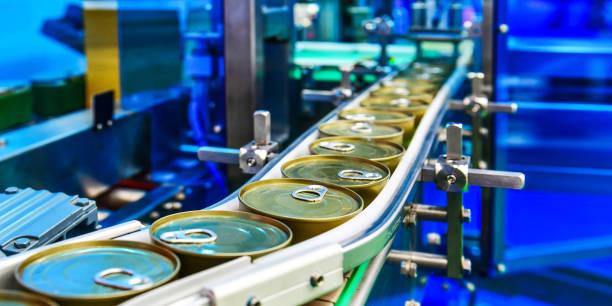-
Ροή Δημοσιεύσεων
- ΑΝΑΚΆΛΥΨΕ
-
Σελίδες
-
Ομάδες
-
Reels
-
Blogs
-
Developers
Food Processing Automation Market Demand: Efficiency, Safety & Quality Control

The food industry is undergoing a digital and technological revolution, and at the heart of this transformation lies automation. From robotics and artificial intelligence to IoT-enabled smart systems, automation in food processing is no longer a futuristic concept—it’s a present-day necessity. With rising consumer demand, stricter safety standards, and increasing global competition, the food processing automation market is experiencing rapid growth.
In this blog, we’ll explore the factors driving demand, and how automation is redefining efficiency, safety, and quality control across the global food sector.
Why Automation Matters in Food Processing
Food processing is a complex industry that requires consistency, speed, and precision. Traditional manual methods, though still in use, are often labor-intensive and prone to human error. Automation offers solutions that not only enhance productivity but also address critical concerns like hygiene, worker safety, and food quality.
Key drivers behind the demand include:
-
Rising population and urbanization, leading to increased demand for packaged and processed foods.
-
Stricter food safety regulations, pushing manufacturers to adopt reliable and standardized processes.
-
Labor shortages, making robotics and automated systems a cost-effective solution.
-
Consumer preference for consistency and transparency, fueling the need for precise, automated production.
Buy Now : https://m2squareconsultancy.com/purchase/27
1. Boosting Efficiency Through Automation
Efficiency is the cornerstone of food industry success, and automation technologies are helping companies optimize every step of the production line.
-
Robotic arms handle repetitive tasks like sorting, cutting, and packaging at faster speeds with fewer errors.
-
AI-powered systems predict maintenance needs, reducing downtime and production delays.
-
Automated material handling ensures smooth logistics, reducing waste and improving throughput.
By streamlining operations, automation enables food manufacturers to reduce costs, scale production, and meet rising global demand.
2. Enhancing Food Safety Standards
Food safety is a top priority, especially in a world where consumers are more conscious of what they eat. Automation reduces human contact with food, lowering the risk of contamination.
-
Automated sanitization systems ensure hygiene compliance across production lines.
-
Vision inspection systems detect contaminants, packaging defects, or labeling errors in real-time.
-
IoT-based sensors monitor temperature and humidity to maintain freshness and prevent spoilage.
With automation, companies can achieve higher compliance with global standards like HACCP, FDA, and ISO certifications, strengthening consumer trust.
Request Sample : https://m2squareconsultancy.com/request-sample/food-processing-automation-market
3. Strengthening Quality Control
Quality is what differentiates successful brands in a competitive market. Automated systems ensure consistent standards across batches and minimize variations.
-
Machine vision technology checks for color, size, and texture uniformity.
-
AI algorithms analyze data to detect defects or deviations in production.
-
Automated packaging ensures accurate portioning, sealing, and labeling for consumer satisfaction.
This level of precision allows companies to maintain brand reputation while reducing product recalls and waste.
4. The Role of Emerging Technologies
The future of food processing automation is being shaped by advanced technologies:
-
Artificial Intelligence (AI) & Machine Learning → predictive analytics for demand forecasting and production planning.
-
Internet of Things (IoT) → real-time monitoring and smart factories for greater transparency.
-
Collaborative Robots (Cobots) → working alongside human workers to improve safety and productivity.
-
Blockchain Integration → ensuring traceability and authenticity in the supply chain.
These innovations not only enhance efficiency but also align with consumer demands for sustainable and transparent food production.
5. Sustainability as a Key Driver
Automation is also helping the industry move toward sustainable practices by:
-
Reducing energy consumption through smart systems.
-
Minimizing food waste with precise portion control.
-
Supporting recyclable and eco-friendly packaging solutions.
Sustainability is not just about meeting regulations—it’s becoming a competitive advantage for companies that want to appeal to environmentally conscious consumers.
Global Market Outlook
The food processing automation market is expected to see significant growth in the coming years. Regions such as North America and Europe lead adoption due to advanced infrastructure and regulations, while Asia-Pacific is emerging as a fast-growing market, fueled by rising food demand and technological investments.
Key players like ABB, Rockwell Automation, Siemens, and Mitsubishi Electric are investing heavily in robotics, AI, and IoT-based solutions to capture this demand.
Conclusion
The demand for food processing automation is driven by the need for efficiency, safety, and quality control in a highly competitive and regulated industry. As consumer expectations evolve and technology continues to advance, automation will become an indispensable part of the global food supply chain.
Companies that invest in smart, sustainable, and consumer-centric automation solutions today will not only meet current demands but also secure a stronger position in the future of food manufacturing.
Related Reports:
https://m2squareconsultancy.com/reports/industrial-gases-market
https://m2squareconsultancy.com/reports/implantable-medical-devices-market
https://m2squareconsultancy.com/reports/remote-patient-monitoring-devices-market
https://m2squareconsultancy.com/reports/water-for-injection-market
https://m2squareconsultancy.com/reports/optical-sensors-market
https://m2squareconsultancy.com/reports/plant-growth-regulators-market
https://m2squareconsultancy.com/reports/solar-pumps-market
https://m2squareconsultancy.com/reports/paper-packaging-market
https://m2squareconsultancy.com/reports/ambulance-vehicle-market
About M2 Square Consultancy
M2 Square Consultancy is a purpose-driven market research and consulting firm dedicated to turning data into insight. Established in 2023, the company helps businesses make strategic, informed decisions through robust considerations studies, competitive intelligence, and trend forecasting
Get in Touch
Ready to elevate your strategy or explore custom market insights? Reach out to the team directly:
Email: [email protected]
Phone (India): +91 80978 74280
Phone (US): +1 929 447 0100
- Art
- Causes
- Crafts
- Dance
- Drinks
- Film
- Fitness
- Food
- Παιχνίδια
- Gardening
- Health
- Κεντρική Σελίδα
- Literature
- Music
- Networking
- άλλο
- Party
- Religion
- Shopping
- Sports
- Theater
- Wellness
